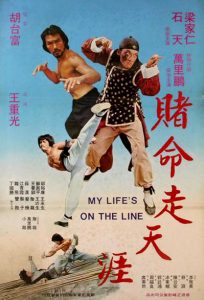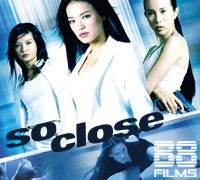AKA: 60 Second Assassin
Director: Wang Chung Kwong
Cast: Leung Kar Yan, Lung Fei, Wang Lee-pang, Dean Shek Tien, Wong Chi Sang, Kong Ching Ha, Su Chen Ping, Chiang Ching-Hsia, Li Long-Yin
Running Time: 91 min.
By Ian Whittle
The problem with the kung fu comedy craze is that it often meant dramatic films felt forced to compromise, inserting goofy scenes alongside the drama. A case in point is My Life’s on the Line, which top bills Leung Kar-yan and Dean Shek. One would think from the poster that this is some sort of buddy comedy starring the two, but in fact the main character is played by third-billed Wang Lee-pang, who I thought I’d never seen in anything before, but it turns out he was a mainstay of the Jackie Chan/Lo Wei films, where he looked far more scruffy.
Wang isn’t much of a leading man, clearly being a graduate of the Jimmy Wang Yu school of never changing one’s expression. He does have some nifty tae-kwon-do skills, but it doesn’t feel like they are showcased that much. Given that the character goes through a fair amount of emotional strife, it’s a pity Leung wasn’t cast in the part, as he is a much more versatile actor (but maybe they only had him for a day).
Wang plays an assassin known as “Minute Fong”, owning to his defeating of his opponents in 60 seconds, which he times with a pocket watch. And as a fighting character, he gets a heck of an introduction, battling an opponent by a lake, with a glorious rainbow in the background.
Although Fong kills “those who deserve it” (murderers, thieves), he doesn’t work for the law. Instead, he seems to be hired by an organisation, led by Leung (who bizarrely seems to be posing as his second-in-command), who are removing their competition. Fong is clearly getting tired of all this killing and wants to settle down in a normal life. The organisation doesn’t seem to have planned for pensions or voluntary redundancy, so they give him a final job which is clearly morally ambiguous. And to make sure he does it, they’ve hired a pair of assassins to monitor him.
The first third of the film is very grim and dark…well almost. Fong abandons his harlot girlfriend to the mercy of her two owners…who talk in unison. It’s more disturbing then funny, given that they are otherwise rather convincingly nasty bullies. Things get worse, MUCH worse, when Fong goes on his final mission, which involves him interacting with an annoying fat kid who ruins the middle section of the film more than a hundred Dean Sheks.
Speaking of which, Shek turns up in one scene as a spoiled rich, port-wine stained wacko who chases girls. And he’s actually fairly funny here.
The final third is thankfully dark, dark, dark so we get to see some decent tragedy and very aggressive fighting rewarding the patient viewer. Leung’s two thugs are quite repulsive characters, which makes their villainy effective and their defeat gratifying. Funnily enough, Leung is too likable to really prove an effective counter to the sullen “hero” (who gets people killed via abandoning them to their fates TWICE) so the final battle’s resolution is appropriately ambiguous (and cartoon blood running down the screen is always cool!)
Soundtrack notes: The main title theme is from a re-recording of Max Steiner’s score to the original 1933 King Kong, the love theme is “Anya’s Theme” from the soundtrack album to The Spy Who Loved Me (it’s not in the film itself), and one scene of Leung conspiratorially plotting is the destruction of the Death Star music from Star Wars!
Ian Whittle’s Rating: 6/10
By Joseph Kuby
Directorial debuts are never meant to be this ambitious but alas this one shows confidence in a way a lot of first-time Kung Fu movie directors would be shy of showing.
Chester Wong Chung-Gwong’s debut (whose HK title is Sixty Second Assassin) contains unique mise-en-scene for the genre. Rather than having the finale take place in a courtyard of a palace/bungalow, on a beach, on a field/hill top somewhere or in a tea house, this one takes place in a canyon/cliff area of some kind (complete with smoke) before moving temporarily into a coal mine and then into the canyon/cliff area complete with geysers (ala One Armed Boxer); whereas the very last fight scene takes place outside a more Westernized building where there’s poles of bamboo placed to form a slew of pyramids.
I think Chester was aiming for a Western feel and his direction reminds me of the guy who did King Boxer a.k.a. Five Fingers of Death. The director of Lo Lieh’s big hit movie said he felt Westerns had a preferable flair for pace than Asian films and always tried to emulate the pace of those films which is probably why King Boxer started the trend of Kung Fu films in the West.
A sterling example of the Western iconography Chester chose is the use of Western clocks and watches. The first part of the final showdown where we see One Minute Fong (the Taiwanese title of the film is Minute Fong) take on two assailants is acute in depicting an Eastern Western. The opening shot of this encounter contains a shot that’s similar to the Mexican stand-off between the three leads in the ‘The Good, The Bad and The Ugly’.
The course of the narrative is fresh for the most part. Even though it contains revenge and training, it does these with unexpected turns and handles them in a new setting.
Not bad for a directorial debut. Chester Wong became the director after working as assistant director on Return of the Chinese Boxer and the Jimmy Wang Yu/David Chiang effort One Armed Swordsmen. Hu Tai-Fu was the producer for this flick after working on the planning of One Armed Swordsman Against Nine Killers. Hu was appreciative of Chester’s professionalism and couldn’t think of somebody else more organized.
The UK DVD cover might mislead people. I thought it was going to be a comedy due to the expression of the assassin’s face. Whilst there is humor in this film, especially in one scene with comic maestro Dean Shek, it’s mainly a drama and, come to think of it, the image on the front cover wasn’t really intended for humorous purposes at all (chalk it down to the dubious timing of the still photographer or even the acting).
The lead actor, Wan Li Pang, is somewhat stiff though I suppose the implication is that he’s a character of a stern nature. He starts to loosen up facially towards the end, perhaps because he starts to become more like a human being and feels emotional when he acquaints himself with a family whose grandfather he has to kill (something he finds out only after a subtle clue the elderly figure inadvertently gives away).
I think good acting is as much to do with fluctuations of the voice as visual expression. John Hurt was limited facially when it came to doing David Lynch’s Elephant Man and he stressed how underrated the voice is as a tool to deliver emotion. Therefore, Wan’s performance could be better received under the circumstances of hearing him in the original Mandarin soundtrack.
Any limitations perceived in Wan are compensated by fiery performances by the other members of the cast. Lung Fei (the Chinese Pat Morita) is in fine form as is Shing Fui On (who played the gang leader in John Woo’s The Killer).
There are some satisfactory bouts of combat but the emphasis is on the interaction between the characters which is what makes this more distinctive than a lot of films round this period where there was a fight every three minutes or so.
When the fight scenes do arrive, they are worth the wait. There is a balanced emphasis of circular and linear movements. The techniques are executed in a way which, when isolating each person, would be good for Kung Fu practice.
One of the stunt coordinators is Wan. He assisted Jackie in the choreography for Spiritual Kung Fu. Wan also appeared in a few films with Jackie during the Lo Wei era. Spiritual Kung Fu being one of them. Wan proves to be no less commendable than John Liu when it comes to kicking. The advantage Wan has is that he is just as good with his left leg as his right.
The production values were quite high as well, maybe not on the level of a Shaw Brothers film but astonishingly efficient for an independent film.
In 1979, Leung really proved how versatile he was as an actor in this film (as a calculatingly cold gang leader), in Knockabout (as a simple-minded and gullible youngster), The Odd Couple (a hot-headed and sadistic avenger) and Thundering Mantis (a happy-go-lucky fish seller who becomes a traumatized psychopath). I find it strange how Bey Logan called him one-note on his audio commentary for The Odd Couple.
Leung Kar Yan is truly a great actor, easily my favorite actor. Leung, in a way, was the next Bruce Lee. The dramatic intensity of his performances was no less thrilling than Lee’s. Leung also had Lee’s penchant for a low-key yet effective emoting. Remember how Bruce adopted a disguised persona in Fist of Fury? Leung does the same thing in the finale.
He may not have been a thoroughly trained martial artist as Lee was but the fact that Leung delivered complex motion with no formal training meant that the level of impressiveness was the same. For a guy who was a practitioner of soccer than Kung Fu, Leung has a poetic grace when it comes to depicting vigorous exhibitions of physical dexterity.
For more essential LKY viewing, I recommend Secret Service of the Imperial Court (a.k.a. Police Pool of Blood).
Wong Jing is a very big fan of LKY, which is why Wong was always looking out for him (after his career waned in the mid ’80s) to make sure he was never relegated to Taiwanese television or TVB. When watching this film, you will see why Wong likes him.
Commentary on the ending for those who’ve seen it:
It’s baffling at first until one realizes that the watch being kicked in the air represents One Minute Fong’s time is up but the general assumption is that when LKY and Fong jump in the air, both of them kill each other as they land techniques on each other.
Joseph Kuby’s Rating: 8.5/10





Entertaining review! This is one of those movies which sounds like it has an awesome concept (a fighter who can defeat any opponent in 60 seconds), but transferred to screen that awesome factor is somehow lost. Similar to the Cliff Lok vehicle ‘The Ring of Death’, this is a title I’ve tried to watch a couple of times over the years, but it never grabbed my attention and I clocked out early both times. Perhaps I should give it another go…
Been a long time since I’ve seen this flick—-the movie itself wasn’t that memorable to me except for its title, and the fights of course. Totally forgot Leung Kar Yan was in this—I liked this trailer, so maybe I should check it out again.
Donde encuentro los subtitulos de esta pelicula?